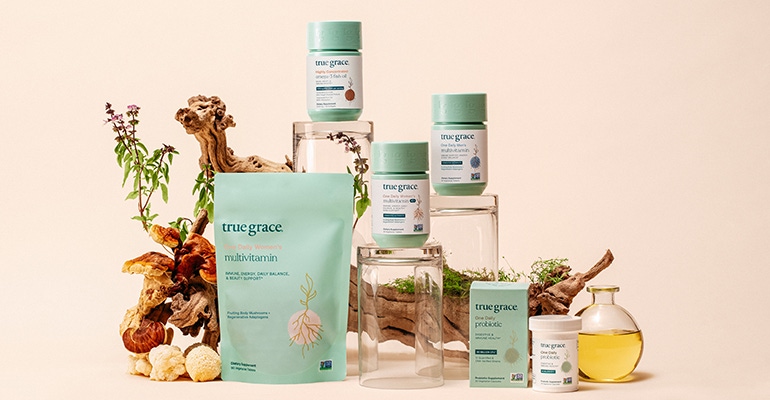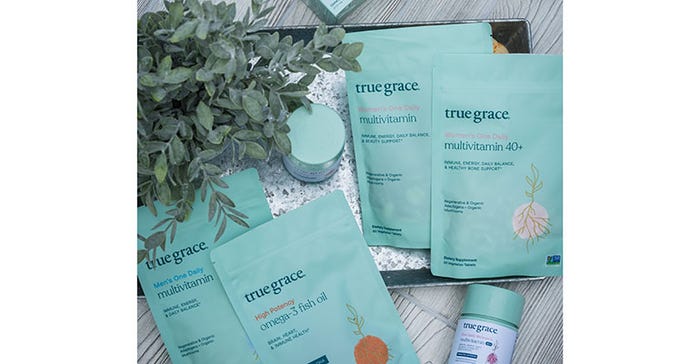
Supplement brand True Grace is built on three related missions. It provides nutrient-dense products to improve the health and wellbeing of future generations. Another part of its mission is to encourage education. But a significant part of its mission is dedicated to sustainability.
On paper, True Grace products are formulated to combat the nutritional deficiencies in our soil, communities and diets. In practice, this means that eco-initiatives are front and center. Recently, True Grace announced a partnership with Rodale Institute to support scientific research on how regenerative organic agriculture impacts nutrient density in crops and contributes to climate-change mitigation through carbon sequestration. Known as the Vegetable Systems Trial, this study is the first to examine side-by-side how soil health and farm management practices impact the health of humans and the planet.
In addition to the study, the partnership will also fund counsel and support to farmers interested in transitioning their land to organic systems. Financial support from True Grace will help Rodale provide 300 hours of consulting services to farmers—enough to begin transitioning approximately 30 farms to regenerative organic models in Wisconsin.
Owner and Chief Marketing Officer Kristie Hall discusses True Grace's culture and commitments.
How do you define sustainability?

The regenerative agriculture piece is a huge one for us. We support this holistic way of farming because it regenerates soil, restores food's nutrient density and locks climate-changing carbon underground. In fact, True Grace's leadership team members were all instrumental in the regenerative agriculture movement long before we started True Grace—and we continue to champion the movement today.
Creating a regenerative system that builds toward balance and resiliency doesn't just apply to farming. It's a way to do business. This is what we strive for at True Grace.
What have been some of your most notable sustainability successes?
KH: It's tough to choose, but here are two:
We've teamed up with Rodale Institute on a three-year project to give local farmers access to consulting to help them transition to regenerative agriculture. We plan on continuing these partnerships—we want to tap these farmers to provide nutrient-dense ingredients for True Grace supplements.
Our supplements are packaged in bottles made using post-consumer recycled (PCR) plastic and are meant to be refilled with our refill pouches made from plant-based materials. Each time someone purchases one of these bottles or pouches, plastic is pulled out of the ocean.

How have you introduced innovative packaging into your sustainability mission?
KH: Our bottles, made using PCR plastic, require less energy to produce and release less carbon dioxide than virgin plastic bottles do. For each bottle purchased, plastic is rescued by ReSea Project, an ocean clean-up effort that employs local fishermen in Jakarta, Indonesia, to pull plastic out of waters where they fish.
Our refill pouches, which are made of sustainably sourced plant-based materials, reduce customers' overall use of plastic. Every pouch purchased helps pull plastic out of the ocean through the ReSea Project, as well.
In addition to sustainability, we're all about transparency at True Grace, so we always make it clear that our probiotics are packaged a bit differently. Our probiotic bottles are specially manufactured to extend the probiotics' shelf life.
Why did you decide to prioritize packaging in your sustainability mission?
KH: Ocean health is a priority for all of us at True Grace, and particularly for me personally, since I've spent time on Sanibel Island (Florida) since I was a child. The island is famous for its white sand beaches, abundant wildlife and conservation-focused inhabitants.
On my afternoon walks on the beach, I often wondered if my kids and grandkids would get to enjoy the magic and beauty of seeing dolphins and manatee swim by. I knew how much plastic was in our oceans and waterways, and I was disturbed by what it was doing to ocean life.
Being big supplement consumers in our household, I was alarmed by how many vitamin bottles we had in our recycling bin each month. I was determined to come up with a solution to lessen my personal impact and True Grace's impact on the environment. That's why we partnered with Ocean Waste Plastic to create our beautiful custom bottles that include post-consumer recycled plastic.
I wanted to take it one step further and create refill pouches so our bottles would never end up in the recycle bin at all. By offering refill pouches made from renewable materials, True Grace is 85% less reliant on virgin plastic than we would be if we used newly manufactured plastic bottles for these supplements.
In what ways is your supply chain sustainable? Why is this important to you as a brand?
KH: We source organic and regeneratively grown ingredients wherever possible to help build a more sustainable supply chain for people and the planet. True Grace is also Certified B Corp Pending. B Corps are leading the global shift to an inclusive, equitable and regenerative economy. B Corp certification is rigorous, and supply chain practices are assessed as part of the process (so are input materials, charitable giving and more). In all these areas, we have to meet the highest standards of verified social and environmental performance, public transparency and legal accountability.
How can your retail partners help promote sustainable brands?
KH: A great place to start is by educating staff on the importance of selecting brands that are aligned with the retailer's mission. By doing this, retailers can inspire their customers to do the same.
There are so many ways to get staff on board. Support training initiatives with brand partners. Encourage staff to attend in-person training, enroll in webinars and listen to industry podcasts. Retailers can also partner with strategic brands on marketing initiatives that will drive awareness of topics related to sustainability through social media and other key marketing vehicles.
About the Author(s)
You May Also Like
.png?width=700&auto=webp&quality=80&disable=upscale)


